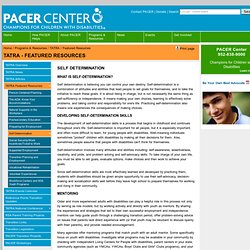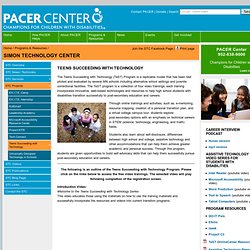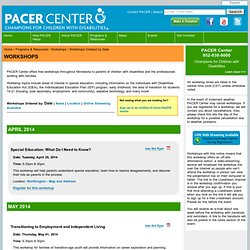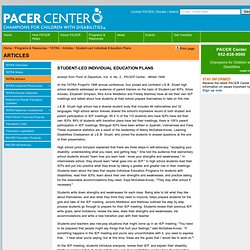

Self Determination. What is Self-Determination?

Self determination is believing you can control your own destiny. Self-determination is a combination of attitudes and abilities that lead people to set goals for themselves, and to take the initiative to reach these goals. It is about being in charge, but is not necessarily the same thing as self-sufficiency or independence. It means making your own choices, learning to effectively solve problems, and taking control and responsibility for one's life. Practicing self-determination also means one experiences the consequences of making choices. Developing Self-Determination Skills The development of self-determination skills is a process that begins in childhood and continues throughout one's life. Self-determination involves many attitudes and abilities including: self-awareness, assertiveness, creativity, and pride, and problem solving and self-advocacy skills. Mentoring Many agencies offer mentoring programs that match youth with an adult mentor. Family Support.
EEOC Home Page. JAN - Job Accommodation Network. Think College. Apps-for-Older-Learners-Hand-Out.pdf (application/pdf Object) Students Get Involved! Center Archived Webinar Listing. Simon Technology Center:Teens Succeeding With Technology. The Teens Succeeding with Technology (TeST) Program is a replicable model that has been test piloted and evaluated by several MN schools including alternative school settings and juvenile correctional facilities.

The TeST program is a collection of four video trainings; each training incorporates innovative, web-based technologies and resources to help high school students with disabilities transition successfully to post-secondary education and careers. Through online trainings and activities, such as; e-mentoring, resource mapping, creation of a personal transition plan, and a virtual college campus tour; students explore post-secondary options with an emphasis on technical careers in STEM (science, technology, engineering, and math) fields.
Students also learn about self-disclosure, differences between high school and college, assistive technology and other accommodations that can help them achieve greater academic and personal success. This project is funded by a Carl D. Center - Parents Programs, Parents Workshops of Special Needs Children. PACER Center offers free workshops throughout Minnesota to parents of children with disabilities and the professionals working with families.

Workshop topics include areas of interest in special education, including information on the Individuals with Disabilities Education Act (IDEA), the Individualized Education Plan (IEP) program, early childhood, the area of transition for students 14-21 (housing, post secondary, employment, and community), assistive technology, and many more! Workshops Ordered by: Date | Order Worksops by Name | Order Worksops by Location | Order Worksops by Online Streaming Available April 2014 Special Education: What Do I Need to Know? Date: Tuesday, April 29, 2014 Time: 6:30pm-8:30pm This workshop will help parents understand special education, learn how to resolve disagreements, and discover their role as parents in the process. May 2014 June 2014. Student-Led Individual Education Plans. Excerpt from Point of Departure, Vol. 4, No. 2...PACER Center...Winter 1999 At the TATRA Project's 1998 annual conference, four poised and confident J.E.B.

Stuart high school students addressed an audience of parent trainers on the topic of Student-Led IEPs. Silvia Arevalo, Elizabeth Simpson, Rita Anne Middleton and Freddy Martinez have all led their own IEP meetings and talked about how students at their school prepare themselves to take on this role. J.E.B. Stuart high school has a diverse student body that includes 46 nationalities and 32 languages. High school junior Simpson explained that there are three steps in self-advocacy: "accepting your disability; understanding what you need; and getting help. " Students write down strengths and weaknesses for each class. Students and teachers also role-play situations that might come up in an IEP meeting.
At the IEP meeting, students introduce everyone, review their IEP, and explain their disability. The benefits?